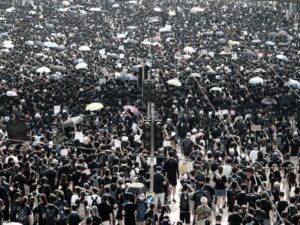The British Financier James Goldsmith once said it’s as if “the rich are enjoying champagne on the deck of the Titanic”. The Titanic was made famous due in part to the conviction it was unsinkable, only for it to sink on its maiden voyage, killing an estimated 1500 people. There is a similar belief about society today. We know we’re hurtling towards an iceberg (the ecological crisis), yet the rich don’t see the need to change course. It’s as if we’ll be able to ride over the iceberg and deal with any consequences when they arrive. They continue sipping on champagne while society continues hurtling towards a catastrophe.
There is a growing acknowledgement (from certain sections of society) that dealing with the ecological crisis requires a paradigm shift. That is, a radical transformation of society so that it works in harmony with the natural world.
Yet, the way the problem is being dealt with is as if all we need to do is tinker with parts of society, and everything will be okay. It seems misguided to imagine the system creating the problem can also be the system that solves those problems, particularly when there is no recognition of the need for transformative change.
There are no calls to redesign society because doing so would disrupt the status quo. That status quo is what makes the rich so fabulously rich. What incentive do they have to encourage transformative change? The only thing a redesign of society would do is risk their position of power.
Missguided convictions
The people who have the power and influence to inspire the necessary changes are the exact group of people who don’t want to make any changes. Hence why the rich are enjoying champagne on top of the Titanic. The rich have to be convinced the ship is unsinkable. No matter how misguided that conviction is, their lifestyles, power, and influence are intertwined with things remaining as they are.
To recognise that change is necessary for humanity to continue flourishing would be to acknowledge that the current way of doing things isn’t sustainable. They simply can’t do that. And so, rather than steering away from our current path, we continue to go full steam ahead.
Our situation differs from the Titanic because we know our current path is leading us to an ecological disaster. Only, to continue with the metaphor, the issue we have is that our ship is the whole of humanity, connected by an integrated globalised economy. The changes our ship is creating will impact the entire Earth.
And so there is no way of getting off the ship, you can go off-grid, but even then, everyone will feel the repercussions of the ecological crisis.
The changes we are creating to the natural world could be so transformational that we will be left helpless when the changes happen. On our current course, there won’t be any life jackets; there won’t be any lifeboats.
Monumental changes
We continue to behave as if that terrible future isn’t lying in front of us because the climate has been remarkably stable for thousands of years. We have never known the planet to be any other way.
The geological record proves the history of the Earth’s climate has been anything but stable. Yet, seeing as the geological record is just that, a record of how the Earth used to be, it doesn’t inspire any kind of reaction.
We live in the world as it is, and so long as the rich keep on reaping the rewards of the system as it is, they will resist any calls to change.
What makes the situation all the more difficult is that the iceberg we’re accelerating towards is invisible. The paradox is that the changes we are making are monumental but, at the same time, slow and subtle. You can’t feel a species go extinct. You can’t see the Greenland ice sheet melting.
And because these changes are happening over decades, it becomes easy to ignore them. The changes don’t evoke a reaction in the same way a bomb would, for example, because it doesn’t feel like there is any danger. This fact makes the rich only more convinced nothing needs to change, as well as the majority in society.
Not my problem
What made the Titanic such a tragedy is that there were only 20 lifeboats onboard. Those lifeboats could accommodate fewer than 1200 of the ship’s 3300 passengers and staff. The deck could have held 32 lifeboats, but it was felt doing so would make the deck more cluttered. You imagine the belief the ship was unsinkable played a part in the decision to be so ill-prepared in the event of a catastrophe.
While the ship was unprepared for an emergency, first-class passengers were 44 per cent more likely to survive than any other passengers when disaster struck. The same goes for the present tragedy being played out before our eyes.
When the ship that is society does crash into an iceberg, it will be the rich who are best placed to deal with the changes.
They may well be the ones encouraging the disaster and reaping the benefits of it. But they will have the resources to best deal with the consequences of their actions. For everyone else, the future could be a nightmare of incomprehensible proportions.
So long as society is designed by the rich, for the rich, it seems the only way anything is going to change is when the ship smashes into that iceberg, and it begins to sink. Only then, with their feet wet, will people recognise the need to change. By that point, it will be too late.



